Architecture in Context: Urban Design of Kuala Lumpur City
| Architecture in Context |
Chapter 1: Introduction
Urban design shows both the functional and aesthetic facets of the City’s built environment. Urban design ( Figure 1a ) , developed harmonizing to policy model and guidelines, creates a desirable life environment every bit good as giving a metropolis an appropriate image and individuality. Like most metropoliss in the underdeveloped universe, Kuala Lumpur has grown quickly and changed a batch from 1960s until now. Kuala Lumpur becomes one of the strongest Asiatic metropoliss in universe economic system during 21Thursdaycentury. The alterations are non merely in footings of edifice building and besides the ‘growing’ of the city’s skyline.
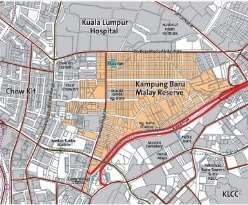
Figure 1b: Location of Kampung Baru
Some of high-rise edifices appear bit by bit in the metropolis and turn vertically from the skyline of metropolis. However, in Kampung Baru country ( Figure 1b ) , it creates a most contrast phenomenon which is high rise edifices and old houses appear together in the aureate trigon of the metropolis. High-rise edifice prototype of modern, high engineering and comfortable edifice while old houses conjure images of old, conservative and disintegrating houses. High rise edifice has its commercial value and makes a part to the economic system of our state however old houses contain its historical value and stand for the beginning characteristics of metropolis development.
There are some contradiction and struggle against to do think of pulverizing the old houses in the metropolis to do manner for more future development.
The aim of composing this essay is to measure and analyze the skyline of KL country and the urban developed schemes from the past until presents. Besides that, to look into and understand the cultural contexts, societal and faith which influence a batch to the people who lives in that country are besides parts of the aims. Identify the demands, perceptual experiences and values of specific cultural communities make a clear apprehension of the architecture issue.
Chapter 2: History BACKGROUND
Chapter 2.1: History background of the alterations of KL city’s development
Figure 2.1: Natural characteristic of KL in 1960Figure 2.2: The development of KL in 80s
Kuala Lumpur was established in 1857 and the KL’s skyline has changed over the old ages. In around 1960, Kuala Lumpur was a simply light-green piece of land ( Figure 2.1 ) with a few of edifices. Towards 80’s ( Figure 2.2 ) , it was the period when the Malayan economic system truly raised up upon. The city’s skyline started to alter quickly until the terminal of 90’s. Harmonizing to the information, this period was Malayan economic system grew more than 8 % per twelvemonth for more than a decennary.
Figure 2.3: Significant development of KL in 1991Figure 2.4: Skyline of KL in presents
The 1990 was a important decennary to the state due to the economic system down bend in the twelvemonth 1997. Not merely did Malaysia manage to prolong unbelievable growing, the other state did besides travel into the Great Financial Crisis. This fiscal crisis caused most of Malaysia’s important developments ( Figure 2.3 ) were made. There are many building undertakings that are being built include the building of the KL Tower and the Petronas Towers. The development of Kuala Lumpur was easy being expanded from the get downing twelvemonth of 2000. In a short period, the skyline of Kuala Lumpur ( Figure 2.4 ) has grown a batch in order to provide the demand of population presents.
This resulted in the outgrowth of big capacity of high rise edifices in the metropolis. Not merely it brings an economic system consequence to our state, and besides received a batch of investing from foreign state. It boosts up a batch of concern and employment chance around the metropolis.
Chapter 2.2: History background of Kampung Baru country
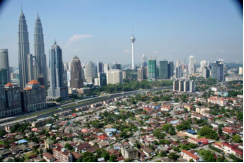
Figure 2.5: Kampung Baru country at the bosom of metropolis
Even so, there is a portion of traditional houses country turns up meanwhile at the bosom of metropolis ( Figure2.5 ) . The being of traditional houses which called Kampung Baru creates a strong contrast between modern architecture edifices and traditional houses. Kampung Baru has been established since 1899 by the British authorities under the name of “Malay Agricultural Settlement” ( M.A.S ) as a particular country reserved specifically for the Malays in Kuala Lumpur. It has 35,000 populations and an country mensurating 153.35 kilometer2.
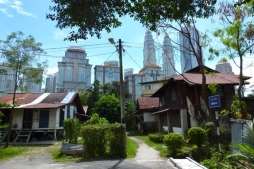
Figure 2.6: Traditional Malay houses of Kampung Baru
The Kampung Baru is characterized by comparative tranquility and neat layout of traditional Malay houses ( Figure 2.6 ) , has comparatively been retarded in its development with hapless roads and sanitation even though the remainder of metropolitan of Kuala Lumpur is basking a roar in economic growing and prosperity. Up to the 1930s, Kampung Baru was strictly a residential small town colony with houses built of wood and supported by pile, with a little gallery, large life room ( normally with no more than three sleeping rooms ) surrounded by garden harvests ( such as chili, banana, tapioca ) and widespread raising of domestic fowl. In this urban small town merely north of the metropolis centre the houses are largely one or two floors.
Kampung Baru was ab initio a residential colony in Kuala Lumpur for Malay lower income group. [ 1 ] In the 1970s, there was a little group of Kampung Baru people who earned RM1000 per month and occupied higher place in the public and private sectors. The state of affairs has really much changed in the 1990s in which the socio-economic position of the dwellers of Kampung Baru had increased. There was rather a important figure of Malay in-between category, such as enterprisers, professionals and executives, who lived in the colony. This can be proven through the building of new luxury residential houses such as cottages and modern flat beside the old traditional Malay hosieries. Thus it can be said that Kampung Baru is a topographic point where tradition and modernness meet.
Kampung Baru located in the Centre of metropolis and the belongings valued at around Rm2000 per square pess. This favorable geographical location attracts a batch of investors and developers intend to develop it and do a better planning. Nevertheless, the devastation of the traditional Malay houses has created contention.
Chapter 2.3:Research method of survey
The nature of this survey makes it suited for me to use site visit, observation, appraising and secondary analysis as my research methodological analysiss. Site visit in survey involves detecting, look intoing, comparing and analyzing. Besides that, research worker makes a questionnaire study signifier for public to acquire cognize about their sentiment of Kampung Baru. It is indispensable for research worker to understand deeply of about the chance development of Kampung Baru. In order to make so, historical informations have been assembled by library and internet research. This research to be done is to turn out my study composing in line with strong grounds.
Chapter 3: Analysis
Chapter 3.1: Percepts of occupant to the renovation of Kampung Baru
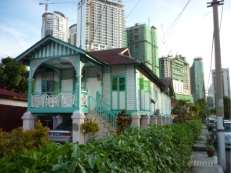
Figure 3.1: Malay-Muslim civilization
Despite being disputed, Kampung Baru is the last fastness against tower block development in the Kuala Lumpur metropolis. The occupants, born and bred in Kampung Baru from coevals to coevals, are chiefly consisted of Malay. Most of them have no purpose of go forthing Kampung Baru. The nucleus ground is for the inveterate love for the community specifically refering on the distinguishable Malay-Muslim civilization ( Figure 3.1 ) and its colorful history. For illustration, some of the senior still recalled their functions in WWII and cherished childhood memories that wanted to prize. They will convey these histories to their kids and grandchildren.
Other than that, there is another state of affairs caused Kampung Baru can’t be developed. If the original Kampung Baru landholders have died, his land rubrics will be shared by tonss of relations. Therefore, it can be more than 100 people portion the rights to some secret plans of land sometimes. This status becomes a strong resistance to the sort of renovation the authorities has in head. The authorities and the developers have been legion meetings and treatment with local landholders about the development programs of Kampung Baru for more than twenty old ages, nevertheless, none of which has proved feasible.
With no execution and development, the physical constructions of Kampung Baru are haphazard and degraded. The unplanned betterment caused resident bit by bit eliminated from their original small town and were replaced by transient and homesteaders. In malice of the recession of Kampung Baru, there are still have many people understood exhaustively its possible commercial value and concern market. In this aureate country with environing high rise edifice, it wholly shows an iconic individuality and image of capital metropolis of Malaysia. Suppose that Kampung Baru transformed into a modern and advanced country, it will heighten the consistent of betterment of Kuala Lumpur towards as a developed metropolis. The modern design, construction and stuff of high rise edifices give an impact of the ocular to stand for an image of the metropolis.
Chapter 3.2: Advantages and disadvantages one time Kampung Baru to be redeveloped
Residents of Kampung Baru have to consider of the advantages and disadvantages one time Kampung Baru to be redeveloped. One of the important effects of the alterations to Kampung Baru is maximize the value of land. In term of merely being dual floor houses, it can be developed vertically. For case, high rise commercial edifices, office, five star hotel or flat. Not merely cut down the land usage, and besides fulfil the demands of big population in the metropolis. Besides that, concern market besides have a batch of possible among this commercial country. The people who live in this country have a high degree of ingestion and quality of life. They would pass a batch for epicurean disbursals.
In add-on, while working the bigger commercial market, it besides increases the employment chance every bit good. It helps to work out the job of extra unemployment which happened in our state. Ample employee can heighten the productiveness expeditiously. Furthermore, owing to this country is tourist attractive force, so that it brings economic system consequence to the metropolis.
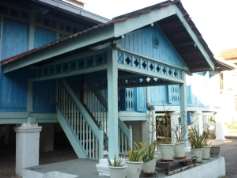
Figure 3.2: Alone character of traditional houses
On the contrary, continuing Kampung Baru has its unmeasurable bing value. It is difficult to conceive of that an country with such a rich heritage and alone character ( Figure 3.2 ) if razed to the land. Many of the traditional houses of Kampung Baru are dated back to the early 1900s. The peculiar and original features can’t be replaced by any unreal engineering presents. If Kampung Baru is turned into a concrete jungle, it will lose all its attractive force as a Centre for Malay heritage.
Furthermore, the cultural component in Kampung Baru has influenced, straight or indirectly, among the community. They hold profound feelings toward their civilization and relationship with vicinity. Woman love to portion their delightful dishes with their neighbors while kids chum uping around the kampung. This sort of sentiment dramas as an of import function in the development of Kampung Baru. There is no uncertainty that the people of Kampung Baru want development, but at the same clip the individuality of Kampung Baru as a Malay community must be maintained.
Chapter 3.3: Comparison with the Singapore urban planning
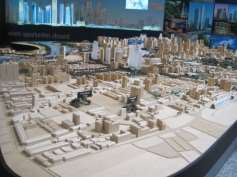
Figure 3.3: Singapore urban planning
By detecting and look intoing Singapore urban planning ( Figure 3.3 ) , they wholly did a good occupation in this little state. Singapore originally is merely a little and lag behind state. After the World War II, Centre of Singapore faced really terrible urban troubles which are overcrowding, lodging deficit and insanitary life conditions. It caused a batch of unemployment job, infective disease and societal offense. In 1958s, the authorities comes out with a construct program [ 2 ] that makes full usage of land by reapportioning the countries severally. In the beginning of urban development, it appears two distinguishable countries which are greenwaies and new town country. First measure is to construct more public lodging in new town country. The decentralised policy leads the population and industry in the metropolis Centre displacement to other topographic point. It creates a balance and mean distribution of population and solved the lacking of lodging jobs.
In the cardinal country, a big sum of stores, office, shopping Centre and epicurean flat occurred. Thoroughly downtown metropolis revived bit by bit, Singapore becomes an international finance, commercial centre and touristry attractive force. It speeds up the economic system growing of Singapore. The authorities of Singapore plans their scheme, from construct, counsel, urban planning to commanding, measure by measure implements it. The attitude of listening to the demands of occupant is the cardinal rule to be succeeded.
Chapter 4: Decision
In decision, Kuala Lumpur as a developing metropolis was improved a batch along the times. Even though Kuala Lumpur is still missing behind in footings of skyline quality compared to bigger metropoliss like Hong Kong, New York, Shanghai or Chicago, but it provides an iconic for its multi-cultural architecture found in traditional and modern edifices in the metropolis. Located within the bosom of aggressive metropolis of Kuala Lumpur, Kampung Baru has struggled to maintain up with monolithic urban development while continuing its traditional heritage. The singularity of this country could non be replaced by any types of trading. The thought of destruction the traditional Malay houses should be taken off. Old structures uncover its historical border and do a contrast with high rise edifice to show the betterment every bit good as development of engineering presents. Attempt to hold a better urban planning and direction in Malaysia, authorities should do an in-depth survey on the scheme of urban planning in Singapore.
Mentions
Website
hypertext transfer protocol: //vincentloy.wordpress.com/tag/city/
hypertext transfer protocol: //www.thestar.com.my/story.aspx/ ? file= % 2F2012 % 2F4 % 2F16 % 2Fcentral % 2F11111102
hypertext transfer protocol: //www.skyscrapercity.com/showthread.php? t=167496
hypertext transfer protocol: //www.dbkl.gov.my/pskl2020/english/urban_design_and_landscape/index.htm
hypertext transfer protocol: //time2transcend.wordpress.com/tag/kampung-baru/
hypertext transfer protocol: //www.theedgemalaysia.com/commentary/167862-my-say-kampung-baru-redevelopment-lets-go-for-it.html
hypertext transfer protocol: //tendtotravel.com/2012/03/kuala-lumpurs-skyline-1960s/
hypertext transfer protocol: //travel.cnn.com/explorations/escape/kampung-baru-131599
hypertext transfer protocol: //infopedia.nl.sg/articles/SIP_1564_2009-09-08.html
hypertext transfer protocol: //lib.iium.edu.my/mom2/cm/content/view/view.jsp? key=mrB8mYjSDrUDQUS5Lamnms8K3SJ42lFB20100225154009406
E-journal
hypertext transfer protocol: //e-journal.um.edu.my/filebank/published_article/3295/Vol % 209-4.pdf
hypertext transfer protocol: //repo.uum.edu.my/3179/1/S15.pdf
Books
Dale, O. J. ( 1999 ) . Urban planning in Singapore: The transmutation of a metropolis. Shah Alam, Malaysia: Oxford University Press.
Suleiman Mohamed and Lokman Mohd. Zen ( 2000 ) , Sejarah Kampung Baru: Di Sini Awal Segalanya Bermula
Handss, J. ( 1941 ) . The History Of The Malay Agricultural Settlement Kuala Lumpur,
Video
hypertext transfer protocol: //fatbidin.com/category/kampung-baru-alaf-baru-aka-new-age-new-village/
Bibliography
Website
hypertext transfer protocol: //tendtotravel.com/2012/03/kuala-lumpurs-skyline-1960s/
hypertext transfer protocol: //www.skyscrapercity.com/showthread.php? t=246455
hypertext transfer protocol: //en.wikipedia.org/wiki/Urban_planning_in_Singapore
hypertext transfer protocol: //infopedia.nl.sg/articles/SIP_1564_2009-09-08.html
hypertext transfer protocol: //timesofmylife.wordpress.com/2010/02/04/big-pore-and-small-pore-of-singapore/
Picture credits
Figure 1.1: hypertext transfer protocol: //wpwide.com/petronas-twin-towers-kuala-lumpur-malaysia-city-wide-hd-wallpaper/
Figure 1.2: hypertext transfer protocol: //www.malaysiapropertynews.com/2010/08/redeveloping-kampung-baru.html
Figure 2.1: hypertext transfer protocol: //tendtotravel.com/2012/03/kuala-lumpurs-skyline-1960s/
Figure 2.2: hypertext transfer protocol: //tendtotravel.com/2012/03/kuala-lumpurs-skyline-1960s/
Figure 2.3: hypertext transfer protocol: //tendtotravel.com/2012/03/kuala-lumpurs-skyline-1960s/
Figure 2.4: hypertext transfer protocol: //tendtotravel.com/2012/03/kuala-lumpurs-skyline-1960s/
Figure 2.5: hypertext transfer protocol: //time2transcend.wordpress.com/tag/kampung-baru/
Figure 2.6: hypertext transfer protocol: //www.ouche.org/DesignEcologies/659/
Figure 3.1: hypertext transfer protocol: //time2transcend.wordpress.com/tag/kampung-baru/
Figure 3.2: hypertext transfer protocol: //time2transcend.wordpress.com/tag/kampung-baru/
Figure 3.3: hypertext transfer protocol: //www.singaporetales.co.uk/2013/09/city-gallery.html
1
Cite this Page
Architecture in Context: Urban Design of Kuala Lumpur City. (2017, Jul 05). Retrieved from https://phdessay.com/architecture-in-context-urban-design-of-kuala-lumpur-city/
Run a free check or have your essay done for you



 450+ experts on 30 subjects
450+ experts on 30 subjects
 Starting from 3 hours delivery
Starting from 3 hours delivery